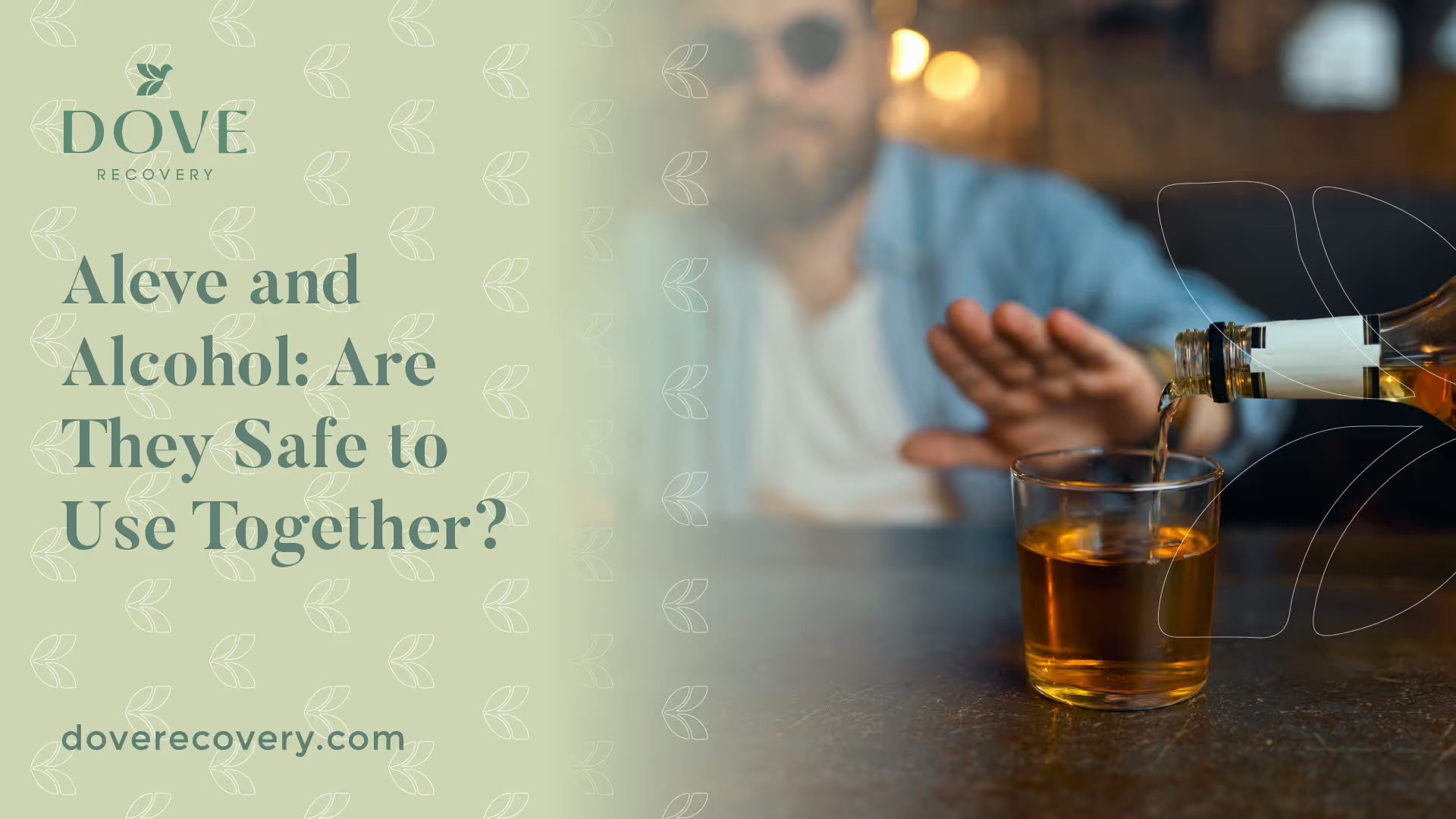Aleve and Alcohol: Are They Safe to Use Together?

Understanding Aleve and Alcohol
To ensure your well-being, it's important to have a clear understanding of Aleve and what happens when alcohol is consumed. This knowledge can help you make informed decisions regarding their potential compatibility.

What is Aleve?
Aleve is a nonsteroidal anti-inflammatory drug (NSAID) that is commonly used to relieve pain, reduce inflammation, and alleviate fever. The active ingredient in Aleve is naproxen, which belongs to a class of medications known as NSAIDs. It works by reducing the production of certain chemicals in the body that cause pain and inflammation.
It's essential to follow the recommended dosage and usage instructions provided by your healthcare provider or the medication label. If you have any concerns or questions about taking Aleve, it's always best to consult with your healthcare provider for personalized advice.
What Happens When Alcohol is Consumed?
Alcohol is a central nervous system depressant that affects various organs and systems in the body. When alcohol is consumed, it is primarily metabolized by the liver. The liver breaks down alcohol into byproducts that are eventually eliminated from the body. However, excessive alcohol consumption or combining alcohol with certain medications can pose risks and potential interactions.
Alcohol can have various effects on the body, including:
- Impaired judgment and coordination
- Increased drowsiness and sedation
- Dehydration
- Gastric irritation
Combining alcohol with certain medications, including Aleve, can potentially increase the risk of adverse effects. It's important to be aware of the potential risks and interactions associated with combining these substances.
By understanding the nature of Aleve and the effects of alcohol consumption, you can make informed decisions regarding their compatibility. If you have any concerns or questions about taking Aleve with alcohol, it is recommended to consult with your healthcare provider for personalized advice. Remember, your health and well-being should always be a priority.
Potential Risks and Interactions
When it comes to the combination of Aleve and alcohol, it's important to be aware of the potential risks and interactions that may arise. While Aleve is commonly used for pain relief, and alcohol is a widely consumed beverage, their simultaneous use can have adverse effects on the body.
Increased Risk of Stomach Irritation
Taking Aleve and consuming alcohol together can increase the risk of stomach irritation. Both substances can individually irritate the lining of the stomach, but when combined, they can intensify the effects. This can lead to symptoms such as abdominal pain, indigestion, and even the development of ulcers. It's crucial to be cautious, especially if you have a history of gastrointestinal issues. If you experience any discomfort or notice any unusual symptoms, it's advisable to consult your healthcare provider.
Liver Toxicity and Damage
One of the major concerns associated with the combination of Aleve and alcohol is the potential for liver toxicity and damage. Both Aleve and alcohol can put a strain on the liver. Aleve contains active ingredients that are metabolized in the liver, and alcohol is primarily metabolized in the liver as well. When used together, they can overwhelm the liver's detoxification capabilities, leading to liver damage over time. Individuals with pre-existing liver conditions or a history of alcohol abuse should exercise extreme caution and consult their healthcare provider before using Aleve.
Intensified Side Effects of Alcohol
Combining Aleve with alcohol can also intensify the side effects of alcohol. Alcohol is a central nervous system depressant, and Aleve can have a similar effect. When used together, they can further depress the central nervous system, leading to increased drowsiness, dizziness, and impaired coordination. This can be especially dangerous if you plan to drive or operate heavy machinery. It's important to be mindful of these effects and avoid engaging in activities that require alertness and concentration.
To ensure your safety, it is recommended to avoid consuming alcohol while taking Aleve. If you are experiencing pain or need relief, consider exploring alternative pain relief options or consulting your healthcare provider for guidance.
Remember, it's crucial to prioritize your health and make informed decisions when it comes to combining medications and alcohol. Always consult your healthcare provider for personalized advice and to understand how certain substances may interact with each other.
Safe Usage Guidelines
When considering the compatibility of Aleve and alcohol, it's important to prioritize your health and safety. Here are some safe usage guidelines to keep in mind:
Consult Your Healthcare Provider
Before combining Aleve and alcohol, it's advisable to consult your healthcare provider. They can provide personalized advice based on your specific medical history and any medications you are currently taking. Your healthcare provider can evaluate the potential risks and benefits, taking into account your individual circumstances.
Follow Recommended Dosages
When using Aleve, it's crucial to adhere to the recommended dosages provided by the manufacturer or as directed by your healthcare provider. Exceeding the recommended dosage can increase the risk of side effects, especially when combined with alcohol. It's essential to read and follow the instructions on the label carefully to ensure you are using the medication safely.
Be Aware of Your Body's Reaction
Everyone's body reacts differently to medications and alcohol. It's important to pay attention to how your body responds when taking Aleve and consuming alcohol. If you experience any adverse effects, such as stomach discomfort, dizziness, or changes in mood, it's advisable to discontinue use and seek medical advice.
By following these safe usage guidelines, you can make informed decisions regarding the use of Aleve and alcohol. Remember, it's always best to consult your healthcare provider for personalized advice and guidance.
Being Mindful of Your Health
When consuming alcohol, it's important to be mindful of your overall health. Alcohol can have negative effects on various aspects of your well-being, including physical, mental, and emotional health. It's crucial to prioritize your well-being and make informed decisions regarding alcohol consumption.
If you choose to consume alcohol, consider these tips to help maintain a healthy lifestyle:
- Stay hydrated: Drink water in between alcoholic beverages to stay hydrated and minimize the risk of dehydration.
- Eat before drinking: Consuming a meal or snacks before drinking can help slow down the absorption of alcohol into your bloodstream.
- Avoid binge drinking: Binge drinking, defined as consuming a large amount of alcohol in a short period, can have serious health consequences. Pace yourself and drink in moderation.
- Never drink and drive: Alcohol impairs judgment and coordination, making it unsafe to operate a vehicle. Always have a designated driver or use alternative transportation if you have been drinking.
By following these guidelines and being mindful of your health, you can enjoy alcohol in a responsible manner. Remember, if you have any concerns about the compatibility of Aleve and alcohol, it's best to seek advice from a healthcare professional.
Note: The information provided here is for informational purposes only and does not replace professional medical advice. Always consult with a healthcare provider before combining medications and alcohol.
Alternatives and Precautions
When it comes to managing pain and discomfort, it's important to consider alternatives and take precautions to ensure your well-being. Here are some suggestions to explore and factors to keep in mind when considering the use of Aleve and alcohol.
Non-Alcoholic Pain Relief Options
If you're concerned about the potential interactions between Aleve and alcohol, there are alternative pain relief options available. Nonsteroidal anti-inflammatory drugs (NSAIDs) like Aleve may not be the only solution for managing pain. It's worth exploring non-alcoholic alternatives such as acetaminophen or topical analgesics. Always consult with your healthcare provider to determine which option is best suited for your specific needs.
Managing Pain and Discomfort Safely
Regardless of the pain relief option you choose, it's crucial to manage pain and discomfort safely. Follow the recommended dosage and frequency provided by your healthcare provider or as indicated on the packaging. Taking more than the recommended dose can lead to potential side effects and complications. It's also important to be mindful of any existing medical conditions or medications you may be taking that could interact with pain relief medications. If you have any concerns or questions, don't hesitate to reach out to your healthcare provider for guidance.
Considerations for Long-Term Use
If you find yourself relying on pain relief medications for an extended period, it's important to consider the long-term use of such medications. Prolonged use of NSAIDs like Aleve can have potential side effects, including stomach irritation and increased risk of gastrointestinal bleeding. Your healthcare provider can provide guidance on the appropriate duration and usage of pain relief medications based on your specific condition.
It's crucial to stay informed about the potential risks and interactions associated with combining Aleve and alcohol. Understanding the alternatives available and taking precautions when using pain relief medications can help you make informed decisions about your health.
Remember, it's always advisable to consult with your healthcare provider for personalized advice regarding pain management and the use of medication. They can guide you in finding the most suitable options for your specific needs while prioritizing your health and well-being.
Making Informed Decisions
When it comes to the compatibility of Aleve and alcohol, it's important to prioritize your health and safety. While there is limited research on the direct interaction between Aleve and alcohol, it is generally recommended to avoid consuming alcohol while taking Aleve or any other nonsteroidal anti-inflammatory drugs (NSAIDs).
Taking Aleve and alcohol together can potentially increase the risk of stomach irritation, liver toxicity, and intensify the side effects of alcohol. Stomach irritation and ulcers are possible when combining these substances, as both Aleve and alcohol can irritate the lining of the stomach. The liver can also be affected, as it metabolizes both Aleve and alcohol, potentially leading to liver damage over time. Additionally, the side effects of alcohol, such as drowsiness and dizziness, may be intensified by the use of Aleve.
To ensure your well-being and minimize potential risks, it is advisable to follow these guidelines:
- Consult Your Healthcare Provider: If you have any concerns or questions about the compatibility of Aleve and alcohol, it is best to consult your healthcare provider. They can provide personalized advice based on your specific health conditions and medications.
- Follow Recommended Dosages: When taking Aleve or any other medication, it is crucial to adhere to the recommended dosages. Taking higher doses of Aleve or consuming excessive amounts of alcohol can increase the likelihood of adverse effects.
- Be Aware of Your Body's Reaction: Pay close attention to how your body reacts when taking Aleve and consuming alcohol. If you experience any unusual symptoms or discomfort, it is important to seek medical attention promptly. Keep in mind that everyone's body is unique, and individual reactions may vary.
Conclusion
If you are in need of pain relief and are concerned about the interaction between Aleve and alcohol, there are alternative non-alcoholic pain relief options available. Additionally, managing pain and discomfort safely through other means, such as physical therapy or alternative therapies, may be worth exploring. It is important to prioritize your health and well-being above all else.
Ultimately, the decision of whether to take Aleve with alcohol should be based on careful consideration and consultation with a healthcare professional. By making informed decisions and being mindful of the potential risks, you can take steps towards maintaining your health and supporting your overall well-being.
